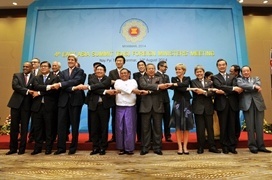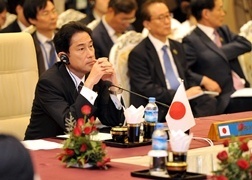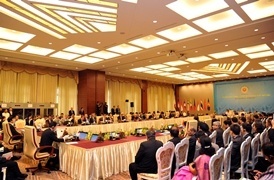Asia
4th East Asia Summit (EAS) Foreign Ministers’ Meeting
August 10, 2014



The 4th East Asia Summit (EAS) Foreign Ministers' Meeting was held on August 10, 2014 in Nay Pyi Taw, Myanmar. Foreign Minister Fumio Kishida attended the meeting. The following is a summary of Foreign Minister Kishida's statement delivered during the meeting.
Opening Remarks
Foreign Minister Kishida opened his statement by expressing his heartfelt appreciation to Foreign Minister Wunna Maung Lwin and the Government of Myanmar for the preparation and warm hospitality for the EAS.
Follow-Up of the 8th EAS
(1) Strengthening the EAS
Minister Kishida emphasized that Japan puts importance on EAS as an opportunity for the regional leaders to assemble, and that the EAS should be strengthened as a premier forum of the region while respecting ASEAN Centrality.
He welcomed that ASEAN is undergoing a review of the EAS and hoped that this review will lead to strengthening the EAS through concrete reform.
(2) Maritime Cooperation
Foreign Minister Kishida stressed that the seas constitute the global commons important for the region and its order must be maintained based on the "the rule of law". On this note, he welcomed Vietnam's hosting of the 3rd Expanded ASEAN Maritime Forum (EAMF). He announced that Japan will cooperate in the field of marine environment through the Expanded ASEAN Seafarers' Training (EAST) Initiative and will carry out follow-up work on the outcomes of the Study Group.
(3) Low-Carbon Growth
Minister Kishida introduced that Japan co-hosted with Cambodia the 2nd East Asia Low Carbon Growth Partnership Dialogue in Tokyo last May, and based on the outcomes, it will host a high-level forum in Japan by the end of this fiscal year. He also looked forward to close coordination and cooperation with EAS Participating Countries, including in establishing and promoting Joint Crediting Mechanism.
(4) Disaster Management
Foreign Minister Kishida wished to continue to actively enhance cooperation in the field of disaster management by cooperating with EAS Participating Countries who have continued to tackle natural disasters for a long time. Thus, he welcomed the EAS Guidelines for Rapid Disaster Response proposed by Australia and the Philippines. He also indicated that Japan will continue to assist the ASEAN Coordinating Center for Humanitarian Assistance on Disaster Management (AHA Center) as a regional hub through the provision of ICT equipment and human resource development among others. Furthermore, the Minister introduced that Japan will host the Third UN World Conference on Disaster Risk Reduction in the City of Sendai in March 2015, hoping for the success of the Conference with active participation of global leaders and ministers.
Regional and Global Issues
(1) North Korea
Foreign Minister Kishida emphasized that Japan's policy of aiming for a comprehensive resolution of outstanding issues of concern such as the abductions, nuclear and missile issues remains unchanged. He stated that North Korea continues to pursue becoming a "nuclear state", and has recently launched ballistic missiles repetitively in clear violation of the UN Security Council resolutions.
He stressed that the international community must maintain a firm stance against North Korea's nuclear programs and its provocative actions.
Furthermore, the Minister introduced that North Korea has begun a comprehensive and full-scale investigations on all Japanese nationals, including the abductees, adding that Japan lifted some measures against North Korea, while maintaining measures under the UN Security Council resolutions. He expressed Japan's intention to carefully assess the result of the investigations and asked for the parties' understanding and cooperation on the abductions issue. He also expressed his concern on the human rights situation in North Korea that was addressed in the report by the Commission of Inquiry on Human Rights in the Democratic People's Republic of Korea (COI) and committed to continue to work with each country toward the improvement of the situation.
(2) South China Sea
Foreign Minister Kishida emphasized that issues concerning the South China Sea are directly related to the peace and stability of the region, and therefore, a matter of concern for the international community as a whole including Japan. He reiterated the three principles on the rule of law at sea that was proposed by Prime Minister Abe during the Shangri-La Dialogue, namely that (1) states shall make and clarify their claims based on international law, (2) states shall not use force or coercion in trying to drive their claims, (3) states shall seek to settle disputes by peaceful means and expressed that disputes in the South China Sea must be resolved based on the rule of law.
He added that he looks forward to the full and effective implementation of the Declaration of Conduct (DOC) and the early conclusion of the Code of Conduct (COC).

